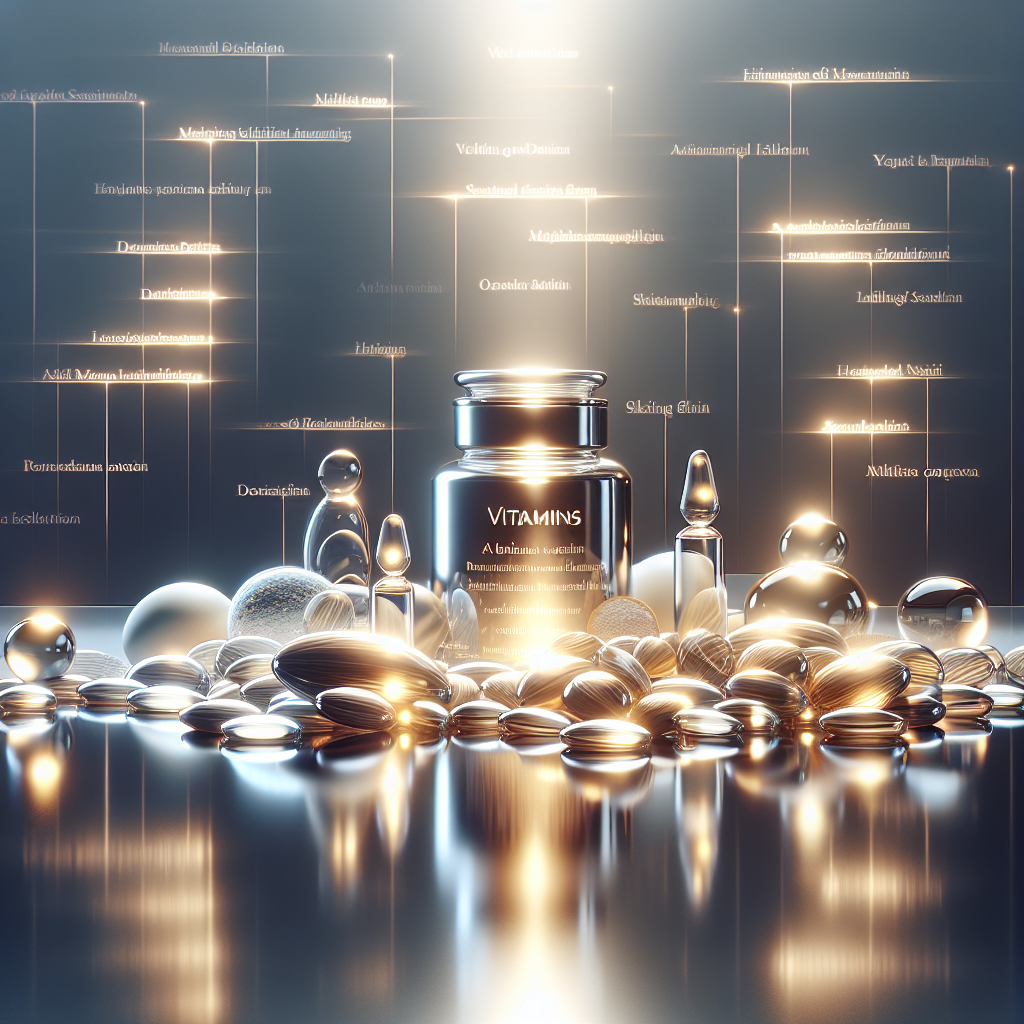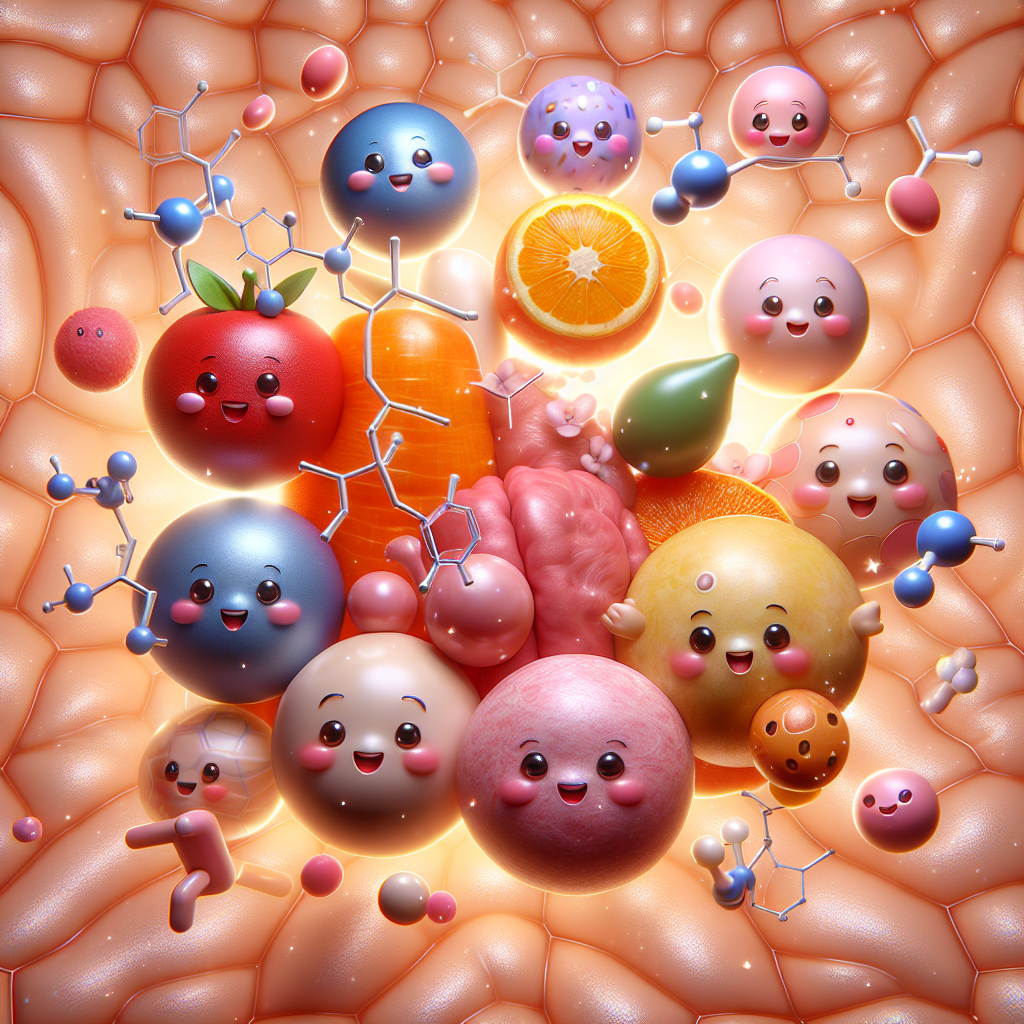Vitamins That Keep Skin Looking Youthful

Discover the secret to youthful-looking skin with our range of vitamins. Don’t wait, rejuvenate your skin today! Click here to explore our products.
Essential Vitamins for Maintaining Youthful Skin
The quest for youthful, radiant skin is a universal pursuit that transcends age, gender, and culture. While many turn to expensive creams, serums, and other topical treatments, the secret to maintaining youthful skin may lie in something far simpler and more accessible: vitamins. Indeed, certain vitamins play a crucial role in skin health, contributing to its elasticity, glow, and overall appearance.
Vitamin A, for instance, is a potent antioxidant that fights against the damaging effects of free radicals, which are unstable molecules that can cause premature aging. It also promotes the production of healthy skin cells, helping to keep the skin firm and smooth. Retinol, a derivative of vitamin A, is a common ingredient in many anti-aging skincare products due to its ability to stimulate collagen production and reduce the appearance of fine lines and wrinkles.
Next in line is Vitamin C, often hailed as a ‘skin savior’. This essential vitamin aids in collagen synthesis, a protein that provides structure and elasticity to the skin. Additionally, Vitamin C is a powerful antioxidant that protects the skin from harmful environmental factors such as UV radiation and pollution. Regular intake of Vitamin C can help to brighten the skin, fade dark spots, and reduce signs of aging.
Vitamin E, another antioxidant, works in tandem with Vitamin C to shield the skin from sun damage. It also has moisturizing properties that can help to prevent dryness and flaking, thereby promoting a healthy skin barrier. Moreover, Vitamin E has been shown to reduce inflammation, which can contribute to a more even skin tone.
Vitamin B3, also known as niacinamide, is another key player in skin health. It helps to improve the skin’s barrier function, which in turn helps to lock in moisture and keep out irritants. Niacinamide also has anti-inflammatory properties, making it beneficial for those with acne-prone or sensitive skin. Furthermore, it can help to minimize the appearance of pores and improve skin texture.
Lastly, Vitamin K is often overlooked but is essential for maintaining youthful skin. It plays a crucial role in the body’s blood clotting process, which can help to speed up the healing of wounds and bruises. Topically applied, Vitamin K can help to reduce under-eye circles and spider veins, contributing to a more youthful appearance.
In conclusion, vitamins play a pivotal role in maintaining youthful, healthy skin. While topical treatments can certainly help, it’s also important to nourish the skin from within by consuming a balanced diet rich in these essential vitamins. Foods such as fruits, vegetables, nuts, seeds, and lean proteins are excellent sources of these skin-loving nutrients. Additionally, it’s always a good idea to consult with a healthcare provider or a dermatologist before starting any new supplement regimen for skin health. Remember, the journey to youthful skin is not a sprint but a marathon, and every small step counts.
The Role of Vitamins in Skin Anti-Aging

The quest for youthful, radiant skin is a universal pursuit that transcends age, gender, and culture. While many turn to expensive creams, serums, and even surgical procedures to maintain a youthful appearance, the role of vitamins in skin anti-aging is often overlooked. Vitamins, both consumed through diet and applied topically, can play a significant role in preserving the skin’s youthful glow and delaying the onset of aging signs.
Vitamin A, also known as retinol, is one of the most potent anti-aging vitamins. It stimulates the production of new skin cells and encourages the growth of collagen, a protein that gives skin its elasticity and firmness. By promoting cell turnover and collagen production, vitamin A helps to reduce the appearance of fine lines, wrinkles, and age spots, leaving the skin looking smoother and more youthful.
Vitamin C, another essential vitamin for skin health, is a powerful antioxidant that protects the skin from damage caused by free radicals. These unstable molecules can accelerate the aging process by breaking down collagen and causing inflammation. By neutralizing free radicals, vitamin C helps to preserve the skin’s elasticity and prevent the formation of wrinkles. Additionally, vitamin C plays a crucial role in the synthesis of collagen, further contributing to the skin’s firmness and smoothness.
Vitamin E, like vitamin C, is a potent antioxidant that protects the skin from oxidative stress. It also has anti-inflammatory properties that can help to soothe and calm irritated skin. Moreover, vitamin E helps to maintain the skin’s moisture balance, preventing dryness and flakiness that can make the skin look older. By keeping the skin hydrated and protected from damage, vitamin E contributes to a healthier, more youthful complexion.
Vitamin B3, also known as niacinamide, is another key player in skin anti-aging. It improves the skin’s barrier function, helping to lock in moisture and keep out irritants. This results in a smoother, plumper skin texture. Additionally, vitamin B3 can reduce the appearance of hyperpigmentation and redness, leading to a more even skin tone.
Vitamin K is often overlooked in discussions of skin health, but it plays a vital role in the healing process. It aids in the body’s blood clotting process, which can help to reduce the appearance of dark circles and bruises. Additionally, vitamin K can help to improve the elasticity of the skin, reducing the appearance of fine lines and wrinkles.
In conclusion, vitamins play a crucial role in maintaining the skin’s youthful appearance. They promote cell turnover, stimulate collagen production, protect the skin from damage, and maintain the skin’s moisture balance. While topical applications of these vitamins can provide immediate benefits, incorporating them into your diet can provide long-term benefits for your skin’s health and appearance. Therefore, a balanced diet rich in these vitamins, coupled with a skincare routine that includes them, can help to keep your skin looking youthful and radiant.
Top Vitamins to Incorporate for a Youthful Skin Glow
The quest for youthful, glowing skin is a universal pursuit that transcends age, gender, and culture. While topical skincare products and treatments play a significant role in maintaining skin health, the importance of nourishing the skin from within cannot be overstated. One of the most effective ways to achieve this is by incorporating certain vitamins into your diet. These vitamins not only promote overall health but also play a crucial role in maintaining the skin’s youthful glow.
Firstly, Vitamin A, often found in foods like sweet potatoes, carrots, and spinach, is a potent antioxidant that aids in the repair and maintenance of the skin. It helps to speed up healing, prevent breakouts, and support the skin’s immune system, thus promoting a youthful appearance. Moreover, Vitamin A is known to reduce wrinkles and fine lines by stimulating the production of new skin cells.
Next on the list is Vitamin C, a powerhouse nutrient that is essential for collagen production. Collagen is a protein that gives the skin its elasticity and firmness, helping to keep wrinkles at bay. Vitamin C also helps to protect the skin from damage caused by free radicals and exposure to UV radiation from the sun. Citrus fruits, strawberries, bell peppers, and broccoli are excellent sources of this vital vitamin.
Vitamin E, another antioxidant, works in tandem with Vitamin C to protect the skin from sun damage. It helps to keep the skin hydrated, reduces inflammation, and can even help to repair damaged skin. Foods rich in Vitamin E include nuts and seeds, spinach, and broccoli.
Vitamin K is another essential nutrient for skin health. It plays a crucial role in the body’s blood clotting process, which helps the skin heal wounds and bruises effectively. Vitamin K can also help to reduce dark circles under the eyes by improving blood circulation. Green leafy vegetables, prunes, and cucumbers are good sources of Vitamin K.
Lastly, the B Vitamins, particularly B3 (niacin) and B5 (pantothenic acid), are essential for maintaining skin health. B3 helps to improve the skin’s barrier function, which helps to lock in moisture and keep out irritants. It can also help to reduce redness and inflammation. B5, on the other hand, helps to keep the skin soft, smooth, and healthy. It has natural moisturizing properties and can help to heal damaged skin. Foods rich in B Vitamins include whole grains, eggs, meat, and avocados.
In conclusion, while topical skincare products are important, incorporating these vitamins into your diet can significantly improve your skin’s health and appearance. However, it’s important to remember that while these vitamins can help to maintain youthful, glowing skin, they are not a substitute for a balanced diet, regular exercise, and a good skincare routine. It’s always best to consult with a healthcare professional before making any significant changes to your diet or supplement regimen. With the right balance of nutrients, your skin can look its best at any age.